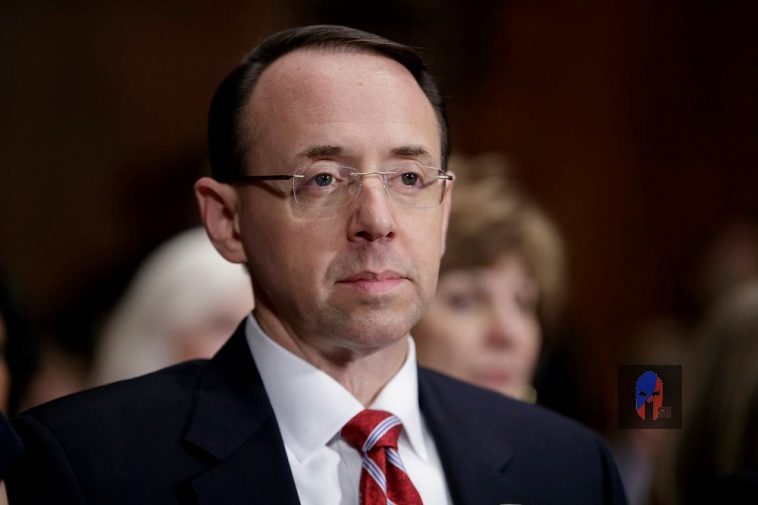An article by Michael Goodwin in the New York Post lays out the issues surrounding a potential firing of Deputy Attorney General Rosenstein;
Rosenstein, two weeks into his new job, reportedly suggested the ideas in a meeting with others at the FBI. He called the Times story “inaccurate” but denied specific allegations with lawyerly wiggle room, meaning Rosenstein is no Brett Kavanaugh when it comes to total assertions of innocence.
Later, the Justice Department conceded Rosenstein made the comments, but insisted he was joking.
…
It took place on May 16, 2017 — exactly a week after Trump fired FBI Director James Comey, according to the Times and other media reports.
…
Indeed, the Times describes Rosenstein’s state of mind as anything but jovial, saying he “appeared conflicted, regretful and emotional.” He was also “angry at Mr. Trump.”
It soon became clear just how angry. The next day, May 17, Rosenstein shocked Washington by appointing Robert Mueller as special counsel and directing him to take over the existing Russia collusion investigation and virtually anything else Mueller wanted to probe.
…
Whether the plot revelation will be the end of Rosenstein is a guessing game. The advantages of keeping him, at least for now, involve calculations about what impact a firing would have on the midterms and the Mueller probe.
In addition, somebody would have to replace Rosenstein, and that’s not a battle Trump needs now, especially with Kavanaugh’s Supreme Court nomination unresolved.
On the other hand, Senate Minority Leader Chuck Schumer warned Trump Friday not to fire Rosenstein. In the political hall of mirrors, that could mean Schumer actually wants Trump to fire him so Dems would have fresh campaign fodder.
Thus, the president has no great option, only two bad ones. Keep the man who wanted to entrap and remove you, or fire him and bring on more trouble than you can handle.
Part of the reason I have been pressing so hard for the firing of Sessions and Rosenstein is what Goodwin describes above, that Trump will face serious political consequences while he is struggling to get Kavanaugh through the Senate and facing the specter of the November elections if he tries to take action on the DoJ right now.
The Mueller/FBI investigation has been damaging the president for the past two years and served as a rallying point for the Democrats, as well as fodder for the Democrats’ impeachment drive. Part of the reason the Democrats (the people at the ground level) are so hysterical is because their leadership has convinced them Trump is a secret Russian agent and that Putin changed peoples’ votes in 2016. This investigation lends credence to that conspiracy theory.
It was important for the president to act early to remove the threat of Mueller and get to the bottom of the “soft coup” attempt. Furthermore, Rosenstein and Sessions are both working to undermine Trump’s authority at DoJ. Because of this, it is impossible for Trump to go after Democrat lawbreakers and “drain the swamp.” It is difficult for me to understate how important it is for Trump to gain control of DoJ, because DoJ is essentially the enforcement arm of the executive branch.
Unfortunately, Trump has dithered and twiddled his thumbs on gaining control of his own government, aided by “10-D chess” conspiracy theorists who think that Sessions and Rosenstein are “secret white hats” who are just pretending to be part of the #Resistance but are secretly on Trump’s side. Because of this, I don’t feel enough pressure has been brought to bear on Trump by his complacent supporters to clean up DoJ.
Regardless of the reasons why, Trump has refused to do anything about Sessions and Rosenstein, and now it’s essentially too late to act before the November elections. The time to clean out DoJ of establishment flacks and Obama holdovers was last year, when there weren’t other critical issues pending, and it’s become a missed opportunity.
Assuming Trump and the GOP survives the November elections, they had better not miss the second chance they will get.



